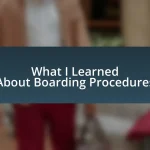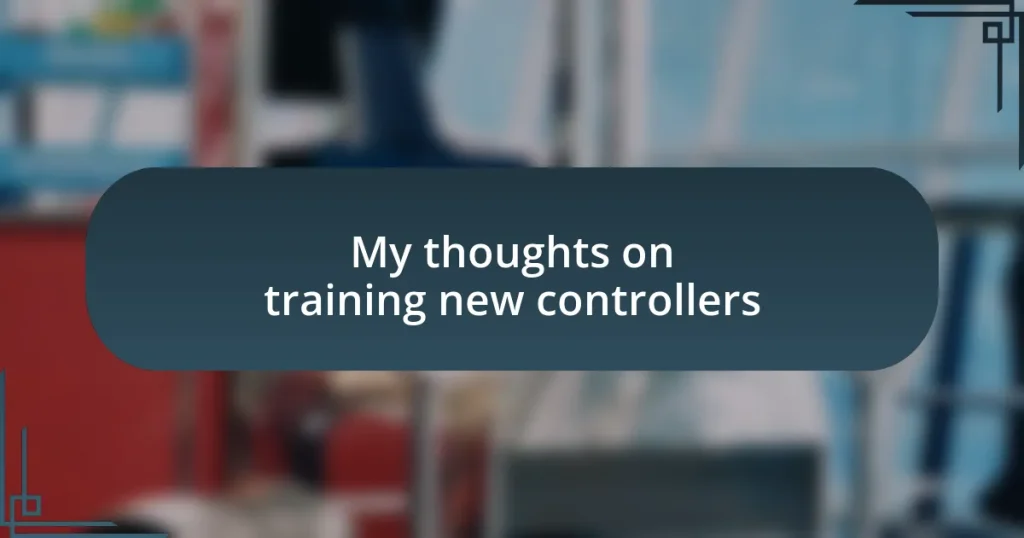Key takeaways:
- Controllers are vital in air traffic management, balancing multiple aircraft while ensuring safety and calmness through effective communication.
- Effective training fosters critical skills such as situational awareness, communication, and adaptability, which are essential for controllers’ success.
- A supportive learning environment enhances trainees’ confidence and encourages open dialogue, enabling personal growth and development.
- Continuous development through workshops, mentorship, and technology is crucial for controllers to adapt and thrive in a dynamic aviation landscape.
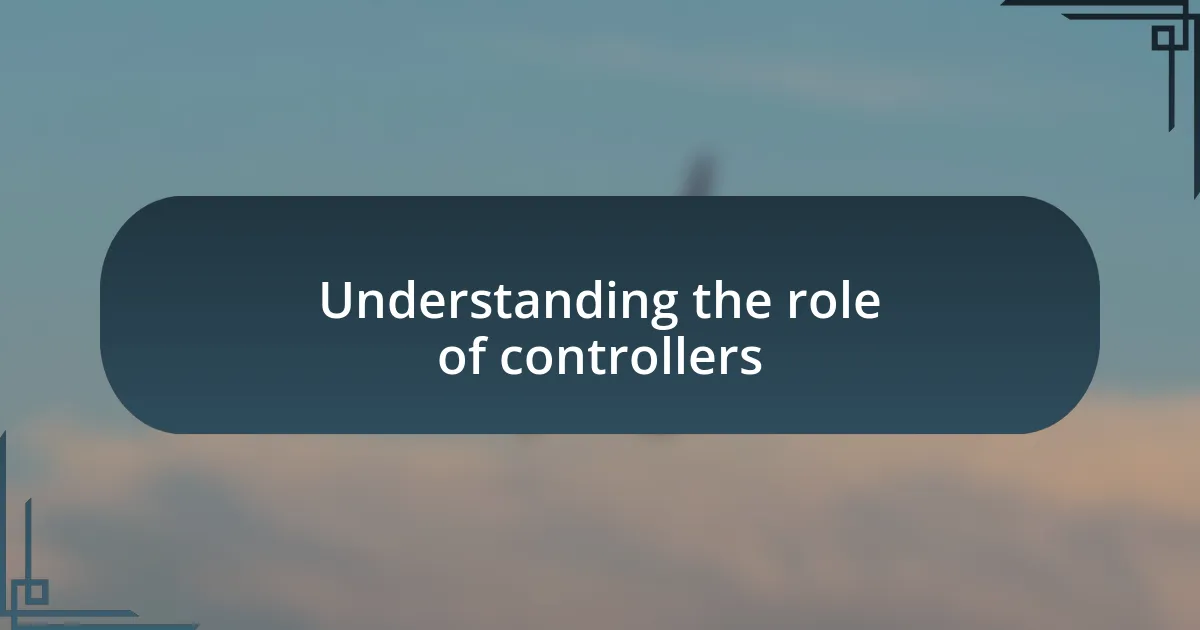
Understanding the role of controllers
Controllers play a pivotal role in air traffic management, acting as the vital link between pilots and the safety of the airspace. When I first started in this field, I was struck by how much reliance pilots place on their controllers. Think about it: can you imagine the pressure of guiding multiple aircraft in real time while maintaining an unwavering focus on safety?
In my experience, controllers don’t just manage traffic; they create a sense of calm amidst chaos. Each decision they make is deeply intertwined with countless variables. I still recall the times when high-stress situations could be resolved with a simple yet effective communication. It reminded me that our calmness could translate into the cockpit and help pilots navigate challenging scenarios—what can be more rewarding than that?
Furthermore, controllers serve as educators and mentors, particularly with new or less experienced pilots. I vividly remember the satisfaction of providing guidance during training flights, knowing that I was influencing a future pilot’s career path. How crucial is it, then, for controllers to have strong communication skills and a deep understanding of their roles? It’s not just a job; it’s being part of a larger ecosystem dedicated to safety and excellence.
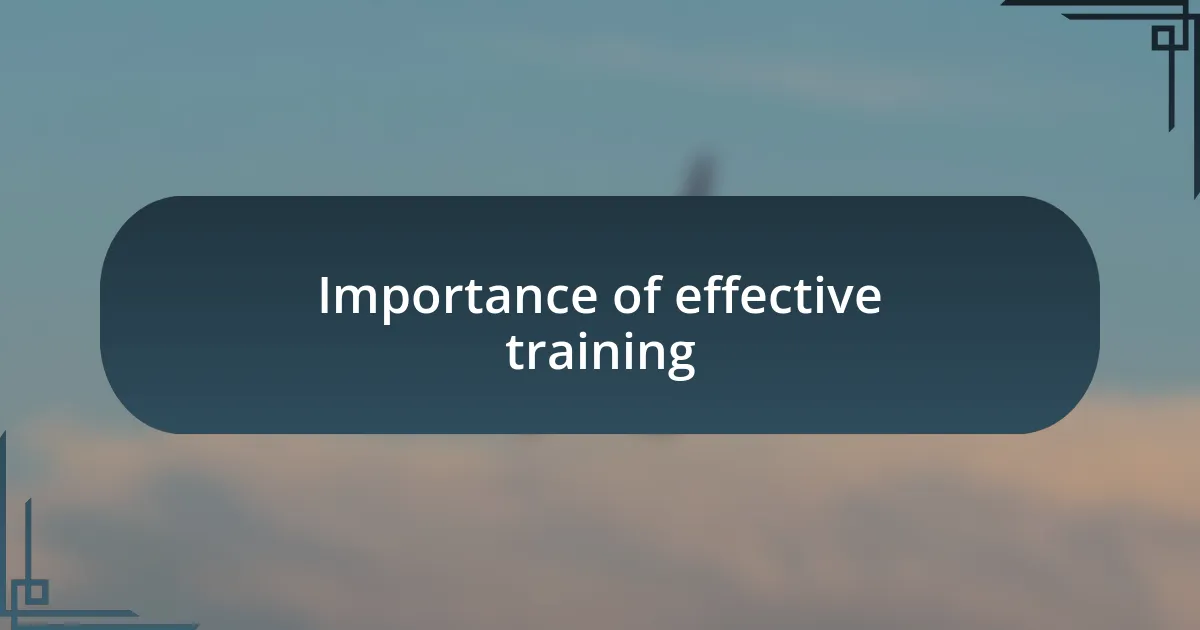
Importance of effective training
Effective training for controllers shapes the quality of air traffic management and directly impacts safety in the skies. When I think back to my own training experiences, I remember how comprehensive programs helped me develop the essential skills needed to handle the challenges of the job. Without effective training, the stakes are too high; errors in judgment can lead to serious consequences, and I’ve seen firsthand how confidence can stem from thorough preparation.
- Well-trained controllers enhance overall safety and efficiency in airspace.
- Effective training fosters strong communication, a skill I’ve always found invaluable.
- Simulation scenarios can replicate real-life pressure, allowing trainees to build resilience.
- Continuous education is crucial, as the aviation landscape evolves rapidly.
- Supportive mentorship during training can have a lasting impact on a controller’s career.
It’s these elements of training that truly resonate with me; they’ve shaped not just my career, but my perception of safety in aviation. I often reflect on how I felt after mastering complex maneuvers in training—each success reinforced the importance of preparation. With the right training, controllers can approach their responsibilities with the calm assurance that makes all the difference.

Key skills for new controllers
New controllers must develop a combination of technical and interpersonal skills to excel in air traffic management. I’ve noticed that strong situational awareness is critical; it’s not just about knowing what’s happening on the radar but also understanding the bigger picture of air traffic dynamics. In my earlier days, I found myself overwhelmed by the sheer volume of information, but through focused training, I learned to filter out distractions and prioritize vital information, which has proven invaluable.
Communication is another fundamental skill that new controllers should prioritize. My experience has shown that clear and precise communication can prevent misunderstandings and potential hazards. I remember a time when a simple, direct exchange with a pilot defused a tense situation. That moment taught me the importance of being concise—something that I continuously strive to improve.
Lastly, adaptability stands out as a key skill in this ever-evolving field. During my training, I faced unexpected scenarios that required quick thinking and flexibility. I learned that being open to change and adjusting strategies on the fly can significantly enhance safety and efficiency. Embracing these skills prepares new controllers for varied challenges in their careers.
| Key Skill | Description |
|---|---|
| Situational Awareness | The ability to perceive and understand the dynamics of air traffic in real-time. |
| Communication | Clear and effective exchanges between controllers and pilots to minimize misunderstandings. |
| Adaptability | Willingness and ability to adjust strategies and techniques in fast-changing scenarios. |
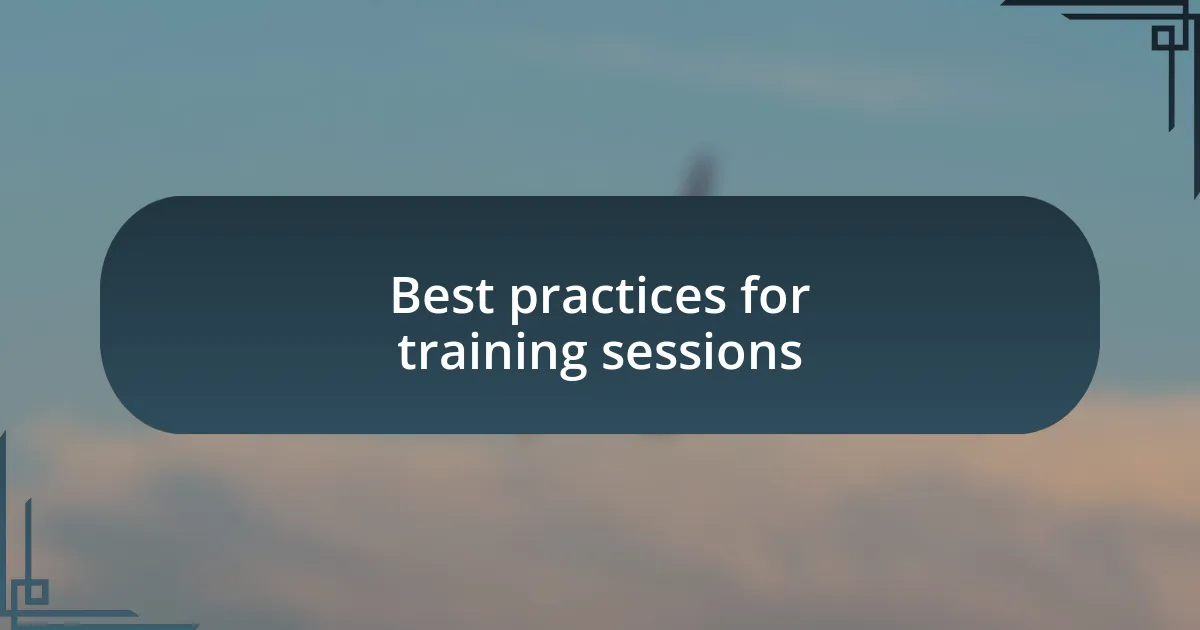
Best practices for training sessions
In my experience, structuring training sessions to balance theory with practical application makes a significant difference. When I was a trainee, I realized the value of hands-on simulations that mirrored real-life scenarios. Those sessions not only reinforced our classroom learning but also built my confidence as I navigated complex situations with guidance.
I’ve found that incorporating feedback loops during training enhances the learning process. After each simulation, we would gather to discuss what went well and areas for improvement. Reflecting on these moments allowed me to internalize lessons much more effectively. Have you ever experienced a moment where constructive feedback led to your breakthrough? For me, those reflections often became the turning points in my development.
Additionally, fostering a collaborative environment is crucial in training new controllers. I remember working in groups, where we shared insights and strategies, creating a sense of camaraderie. It felt reassuring to know I wasn’t alone in my challenges. Building that supportive atmosphere encourages open dialogue, making training sessions not just educational but also enjoyable.
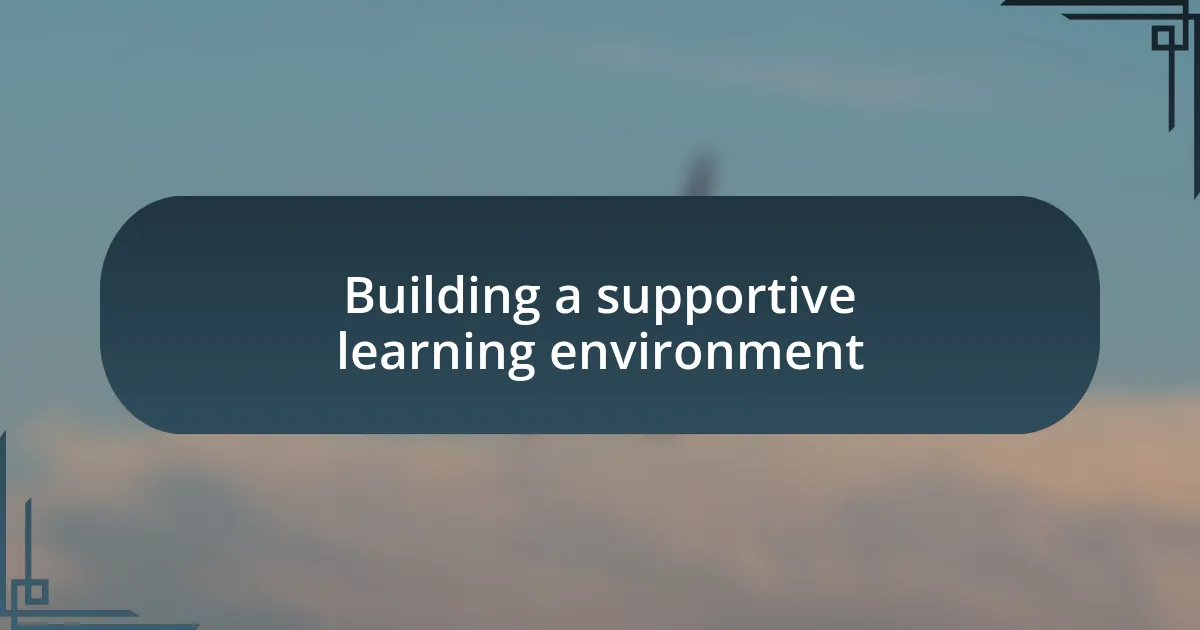
Building a supportive learning environment
Creating a supportive learning environment is essential for new controllers. I vividly recall my first training session; I was nervous and unsure of my abilities. It was the kindness of my trainers and their willingness to listen to my concerns that made all the difference. Does anyone remember feeling that rush of anxiety before stepping into the unknown? I certainly do, and the warmth of that supportive atmosphere helped me push through those initial fears.
One memorable aspect of my training was when we had an informal “share your struggles” session. It transformed the dynamics of our group. I found it liberating to hear my peers talk about their challenges, and it fueled a sense of unity among us. It made me realize that vulnerability could be a powerful tool in learning. I wonder if similar strategies could help others feel less isolated in their learning journey.
Also, it’s intriguing how fostering such an environment can spark a sense of ownership in trainees. I remember when we were encouraged to take the lead during practice runs; it was empowering. I felt more invested in my progress, knowing that my peers and instructors had my back. How does it feel to take that leap of faith? For me, the support I received helped me embrace new responsibilities with confidence, turning potential anxiety into excitement.
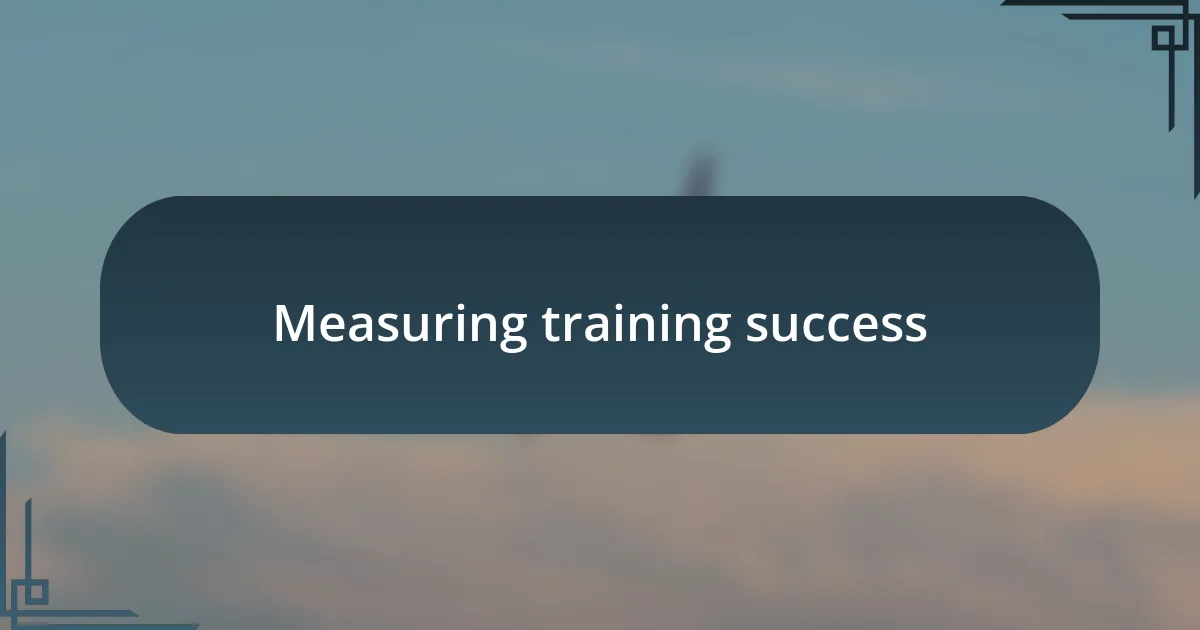
Measuring training success
Measuring the success of training new controllers involves both quantitative and qualitative assessments. I remember attending a debriefing session following a series of training exercises, and the feedback we received was invaluable. It wasn’t just about the performance metrics; hearing from my peers about their experiences helped me grasp what worked and what didn’t. How can we truly understand growth without this context?
Another effective way to measure success is through self-assessment and reflection. I often found myself journaling after each training session, noting my strengths and areas for improvement. This personal accountability not only charted my progress but also highlighted moments of doubt and triumph. Have you ever looked back at your notes and found a nugget of wisdom that changed your mindset? It’s remarkable how self-reflection can become a powerful tool in this journey.
Peer evaluations bring another layer of insight to measuring success. During my training, we regularly engaged in peer reviews, which shaped our development significantly. Often, the feedback from a fellow trainee resonated more deeply with me than formal evaluations. It offered a unique perspective on my growth. What if the most honest assessments come from those who were in the trenches alongside us? That realization made me appreciate the collaborative nature of our training experience even more.
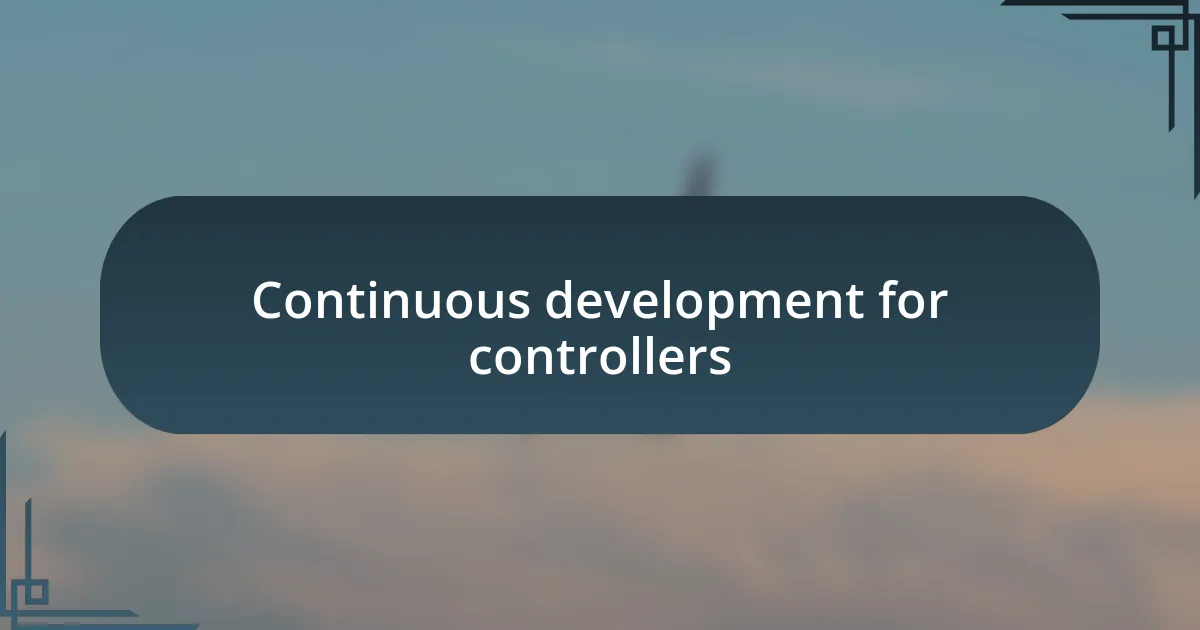
Continuous development for controllers
Continuous development for controllers is essential to ensure they adapt and thrive in a constantly evolving environment. I recall a period after my initial training when I felt a bit stagnant. It was through participation in continuous learning workshops that I not only refreshed my skills but also discovered new techniques to enhance my decision-making abilities. Have you ever experienced a moment where a simple workshop sparked a new perspective in your daily tasks?
Moreover, mentorship plays a crucial role in ongoing development. I once had a mentor who patiently coached me through complex scenarios, providing insights that weren’t always covered in training materials. That one-on-one interaction made a significant difference; it was like having a safety net while I navigated the challenges of the job. Isn’t it fascinating how having someone believe in you can amplify your personal growth?
Lastly, embracing technology can greatly support continuous development for controllers. I’ve found tools like simulation software invaluable, allowing me to practice in a risk-free environment while receiving immediate feedback. It made me wonder: how often do we overlook the potential of technology to enhance our learning? Integrating these resources has not only boosted my confidence but also helped me stay sharp in my skills.








